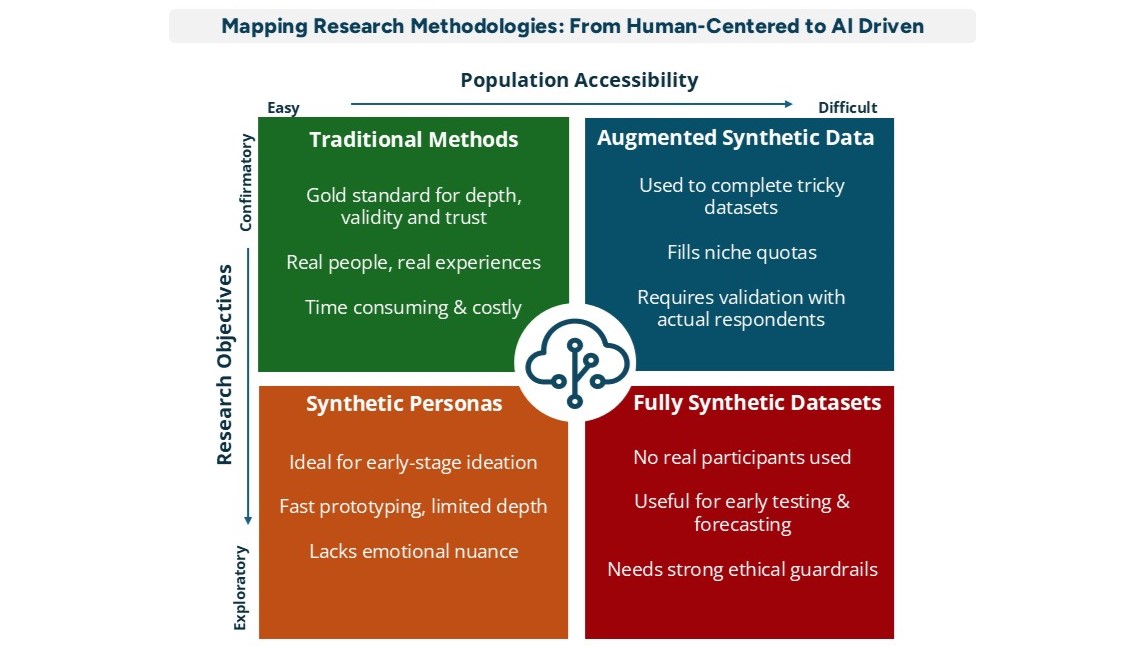Author: Jessica McMahon | Posted On: 14 May 2025
Synthetic data is expected to play a huge role in market research over the next three years, potentially accounting for more than half of all data collected in the US.
Artificial intelligence continues to reshape industries and market research is feeling the ripple effects. Among the most discussed developments is the use of synthetic data to develop AI respondents that simulate real human behaviour and attitudes in surveys and interviews. But as this innovation gains traction, questions around reliability, ethics, and research integrity are quickly rising to the surface.
So, what role can synthetic data play in research today?
What are synthetic respondents?
Synthetic Respondents, sometimes referred to as AI-fabricated participants, are virtual entities generated using machine learning and natural language processing. Their purpose is to mimic how a real person might answer questions, make decisions, or describe preferences. In some cases, they’re deployed to stand in for hard-to-reach populations or to model potential consumer behaviour at scale.
According to ResearchWiseAI, these digital personas come in three distinct forms:
- Augmented synthetic data: used to fill gaps in datasets, particularly in the final stages of research when reaching niche quotas can be time-consuming and costly.
- Synthetic personas: virtual representations of customer segments (e.g. loyalists, early adopters) designed to support ideation, messaging, or product development.
- Fully synthetic datasets: entirely AI-generated responses that bypass traditional fieldwork altogether; a method still in its infancy due to trust and validation concerns.

Why the excitement?
The benefits of synthetic data are compelling. For one, it could be valuable for accessing niche populations, or for modelling responses to hypothetical or unpredictable scenarios, such as policy changes or emerging crises.
Day One Strategy recently used synthetic respondents to research acute myeloid leukaemia, a rare cancer affecting a minority of the population. By creating synthetic personas and validating them through interviews with real patients, the team responsibly bridged a gap that traditional recruitment may have struggled to address.
Why the concern?
Despite the possibilities synthetic data offer, there are growing concerns about the risks of over-reliance and its limitations in capturing genuine human experience.
For starters, humans are prone to anthropomorphise AI; assigning AI with human-like qualities, such as agency and emotional depth it doesn’t actually possess. When we begin to see AI as “like us,” we risk overestimating its ability to replicate genuine human experience and unpredictability.
This is supported by a study conducted by Emporia Research, which found that synthetic data often fails to capture the deeper ‘why’ behind decisions, leading to insights that can lack depth and context.
Moreover, there is currently no industry-wide standard for validating synthetic data. Without clear frameworks for benchmarking, disclosure, or ethical use, researchers may be tempted to adopt these tools without fully understanding their limitations; risking both the accuracy of insights and the trust of stakeholders.
Still, many researchers are beginning to acknowledge that all research carries some form of risk and are therefore increasingly open to shifting that risk toward synthetic methods where the stakes or budget demand it.
So where does that leave us?
Synthetic data is already playing a role in modern research and will likely become more common in years to come. But this growth must be matched with a strong focus on guardrails, ethical standards, and clear validation frameworks. Without these in place, there’s a risk of moving too quickly and using tools we don’t yet fully understand.
While some research teams are beginning to explore the possibilities, such as forecasting behaviours or modelling future scenarios, synthetic data in its current form is best used to complement, not replace, human input. This is particularly true when exploring deeply human concepts like emotion, trust, or lived experience.

If implemented thoughtfully, and with the right oversight, synthetic respondents could eventually reshape how we approach research; helping us ask better questions, model complex outcomes, and test new ideas.
Where fifth quadrant stands
At Fifth Quadrant, one of the leading market research companies in Sydney, our clients can trust that we’re investigating the role of AI-powered fabricated interview platforms as part of our own learning journey. As we navigate this evolving space, we remain grounded in the belief that while synthetic data offers promising opportunities, it can’t yet replace the richness, unpredictability, and emotional depth that real human participants bring to meaningful insight.
Want to learn more?
Fifth Quadrant is a leading authority in AI research. Have questions or want to learn more? For any questions or inquiries, feel free to contact us here.
Posted in Uncategorized

